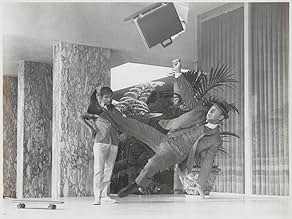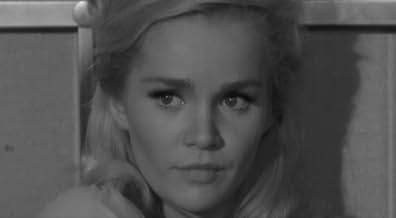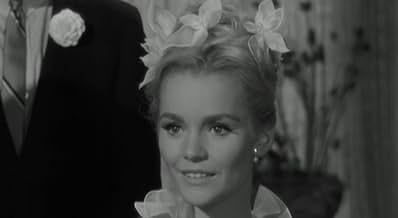IMDb RATING
6.3/10
1.9K
YOUR RATING
A bright satirical comedy about an innocent high school girl granted her wishes by a student prodigy. A broad satire of teenage culture in the sixties, its targets ranging from progressive e... Read allA bright satirical comedy about an innocent high school girl granted her wishes by a student prodigy. A broad satire of teenage culture in the sixties, its targets ranging from progressive education to beach movies.A bright satirical comedy about an innocent high school girl granted her wishes by a student prodigy. A broad satire of teenage culture in the sixties, its targets ranging from progressive education to beach movies.
- Director
- Writers
- Stars
- Awards
- 1 win & 1 nomination total
Joseph Mell
- Dr. Milton Lippman
- (as Joe Mell)
- Director
- Writers
- All cast & crew
- Production, box office & more at IMDbPro
Featured reviews
The early nineteen sixties were the great age of black comic satire in American cinema. Everyone remembers Doctor Strangelove and The Nutty Professor and Lolita and One Two Three and The Loved One.In a sense, this neglected masterpiece was the culmination. Even though Axelrod wasn't a genius like Kubrick or Wilder, this film hits its target just as unerringly. Think of it as a darker, much more savage Rushmore, in which almost all the false Gods of our civilization - phony preachers, psychoanalysis, public "education",consumerism, youth 'culture',- are weighed in the scales and found wanting. Roddy Mcdowall and Tuesday Weld give two of the great comic perfomances. Indeed, Mcdowall is inspirational to any would-be anarchist. Should be seen - and discussed - more often. Scorsese once listed this film among his "guilty pleasures": He has nothing to be guilty about-this is wonderful
I saw this movie in the theater as an eleven-year-old boy, and maybe once on tv more than two decades ago, and it's always remained one of my favorite flicks. I was ecstatic when my sister finally found it for me on video. And after watching it many many times now, I like it just as much, but find it harder than ever to classify. It has: low production values, a love story, teens at the beach, low-budget hijinks, tragedy, sardonic wit, depth and subtlety, really dark parts of the soul, and a wonderfully catchy-shlockly theme song. But all these elements are so wickedly blended that I'm not always sure what's simply a stupid joke and what is jabbing me roughly in my subconscious. It was written, produced and directed by George Axelrod, who has some weighty credentials, including writing and producing "The Manchurian Candidate", so the movie's superficial resemblance to a very cheap 60s teen flick is deceptive, though it's great fun on that level. But the fun parts always carry jagged unseen edges, and any serious commentary is always done wildly tongue-in-cheek. I can't predict who might like this flick, it is too distinctive to categorize, but if you're the type to gamble on an unknown movie that could become a personal lifetime favorite, check this one out.
First time I saw this I could hardly believe the many, many visible boom mikes throughout the film. Loved the picture regardless, and now I've come to accept those boom mikes as characters as central to LORD LOVE A DUCK's frazzled beauty as Roddy McDowall & Tuesday Weld, its stars.
Most knowledgeable film fans hold 70s films in reverence for their embracing of a deeper, richer reality more inspired by novels than by prior Hollywood films. 60s cinema tends to suffer by comparison: it often seems like a clumsy standoff between the death-throes of the old studios and their formulas, and the insisting beating on the door of a new, artistic, more experimental aesthetic: DUCK is one of those, subverting the soundstage-bound Mickey & Judy cliches by emulating that shot-on-indoor-sets look, with the vital modification of peopling this familiar artifical environment with the hyperAmerican grotesques who routinely populate Geo Axelrod's universe. Thus, like a lot of the best 60s movies, DUCK is part-fish, part-fowl and suffused with an atmosphere of strangeness beyond its subject matter - yet, given how Real Life in that decade similarly swayed on unsteady footing in two seperate realities, it works beautifully. And it definitely doesn't hurt that Tuesday Weld is a goddess of apple-cheeked carnality and conspicuous consumption. She may not be Everywoman exactly, but she IS Everywoman who ever dreamed of marrying Elvis, and that's good enough - like the King, you can't help falling in love with her. As has been noted, the 'cashmere sweater' scene is among the most erotic scenes ever caught on film - unnervingly so, given she's playing the scene with, and for, her father.
The movie is chockfull of scenes that similarly push black humor and social satire past the threshold of good taste or story logic; you're either going to go with it, or reject it altogether. I recommend the former: like a lot of underrated and outright ignored 60s movies that don't comfortably fit into any standard category, LORD LOVE A DUCK rewards the viewer who's willing to suspend disbelief for an hour-and-a-half with a totally absorbing and unique unreality all its own. It's a buzz you can only get from an American film made between JFK and Tricky Dick, and it's a hoot besides.
Most knowledgeable film fans hold 70s films in reverence for their embracing of a deeper, richer reality more inspired by novels than by prior Hollywood films. 60s cinema tends to suffer by comparison: it often seems like a clumsy standoff between the death-throes of the old studios and their formulas, and the insisting beating on the door of a new, artistic, more experimental aesthetic: DUCK is one of those, subverting the soundstage-bound Mickey & Judy cliches by emulating that shot-on-indoor-sets look, with the vital modification of peopling this familiar artifical environment with the hyperAmerican grotesques who routinely populate Geo Axelrod's universe. Thus, like a lot of the best 60s movies, DUCK is part-fish, part-fowl and suffused with an atmosphere of strangeness beyond its subject matter - yet, given how Real Life in that decade similarly swayed on unsteady footing in two seperate realities, it works beautifully. And it definitely doesn't hurt that Tuesday Weld is a goddess of apple-cheeked carnality and conspicuous consumption. She may not be Everywoman exactly, but she IS Everywoman who ever dreamed of marrying Elvis, and that's good enough - like the King, you can't help falling in love with her. As has been noted, the 'cashmere sweater' scene is among the most erotic scenes ever caught on film - unnervingly so, given she's playing the scene with, and for, her father.
The movie is chockfull of scenes that similarly push black humor and social satire past the threshold of good taste or story logic; you're either going to go with it, or reject it altogether. I recommend the former: like a lot of underrated and outright ignored 60s movies that don't comfortably fit into any standard category, LORD LOVE A DUCK rewards the viewer who's willing to suspend disbelief for an hour-and-a-half with a totally absorbing and unique unreality all its own. It's a buzz you can only get from an American film made between JFK and Tricky Dick, and it's a hoot besides.
I put this movie in a category with other slightly anarchic anti-establishment movies such as "The Graduate," "If..." and "The Magic Christian." The only difference is that it pre-dates all of them. Being the first of its kind, its a slightly awkward film that doesn't always know what to do with itself. There are plenty of holes in the plot, and, if its a comedy the dramatic scenes are too strident, if its a drama then it is all done with too much flippancy.
On the whole, though, I really enjoyed it. I don't claim to be an expert on the culture of the mid-sixties, but it tackles a lot of topics that seemed to be taboo at the time, like Marie's death, and their rather self-conscious use of the word prostitute.
The acting is all excellent, I was particularly impressed with Tuesday Weld's performance. I had never really thought of her as anything more than the vapid lead to a bunch of teen movies, but I was really surprised at what a good actress she was. Roddy McDowall is excellent as Mollymauk, but the uneveness of the film doesn't do the character justice, and you get the feeling with a little more work on the plot and the pacing, he could have made the film hysterical.
Anyway, it was a good film, particularly impressive when you think of it as the prototype of a genre of film which is still being produced today.
On the whole, though, I really enjoyed it. I don't claim to be an expert on the culture of the mid-sixties, but it tackles a lot of topics that seemed to be taboo at the time, like Marie's death, and their rather self-conscious use of the word prostitute.
The acting is all excellent, I was particularly impressed with Tuesday Weld's performance. I had never really thought of her as anything more than the vapid lead to a bunch of teen movies, but I was really surprised at what a good actress she was. Roddy McDowall is excellent as Mollymauk, but the uneveness of the film doesn't do the character justice, and you get the feeling with a little more work on the plot and the pacing, he could have made the film hysterical.
Anyway, it was a good film, particularly impressive when you think of it as the prototype of a genre of film which is still being produced today.
What strikes me most about this film is its intelligence. The main character, nicknamed Mollymauk after a bird, is a genius, with deep understanding of science, martial arts (he can kick ass), psychology (he can manipulate people at will and hypnotizes Tuesday Weld's character), etc.
McDowall plays the main charcter Alan, nicknamed Mollymauk after a South African duck, THALASSARCHE MELANOPHRYS, in love with the popular Barbara Ann (Tuesday Weld in tight sweaters). At times he is shot in profile making his nose look beak-like. He does a great job, and makes the movie believable.
Although it is a comedy, and has plenty of funny moments, what meant most to me was its criticism of a society which fosters selfishness and lacks any authentic empathy, and its portrayal of Alan's deep love for and devotion to Barbara Ann, which causes him to use his almost super-power level problem-solving and social-engineering skills to fulfill her wishes and dreams without expecting anything in return.
The film is great for its insights into human nature and its parody of conventional high school education and of society. It is well worth seeing, but the main character is complex and not completely sympathetic. He screeches and cavorts like a bird, but instead of coming across as wild and beautiful, he sounds twisted and in pain- which he is, like any adolescent who longs for love, intimacy and understanding but doesn't get any. He seems to create a cult about his his own character, often referring to himself in the third person as Mollymauk. His manipulation and control of others is disturbing as well, even though many people treat each other this way, and so the film has a disturbing effect- it's not a "feel-good" movie.
McDowall plays the main charcter Alan, nicknamed Mollymauk after a South African duck, THALASSARCHE MELANOPHRYS, in love with the popular Barbara Ann (Tuesday Weld in tight sweaters). At times he is shot in profile making his nose look beak-like. He does a great job, and makes the movie believable.
Although it is a comedy, and has plenty of funny moments, what meant most to me was its criticism of a society which fosters selfishness and lacks any authentic empathy, and its portrayal of Alan's deep love for and devotion to Barbara Ann, which causes him to use his almost super-power level problem-solving and social-engineering skills to fulfill her wishes and dreams without expecting anything in return.
The film is great for its insights into human nature and its parody of conventional high school education and of society. It is well worth seeing, but the main character is complex and not completely sympathetic. He screeches and cavorts like a bird, but instead of coming across as wild and beautiful, he sounds twisted and in pain- which he is, like any adolescent who longs for love, intimacy and understanding but doesn't get any. He seems to create a cult about his his own character, often referring to himself in the third person as Mollymauk. His manipulation and control of others is disturbing as well, even though many people treat each other this way, and so the film has a disturbing effect- it's not a "feel-good" movie.
Did you know
- TriviaRoddy McDowall - born September 17, 1928 - was 36 years old, playing a high school senior, when this movie was filmed in 1965 for its February 21, 1966 release. Roddy played opposite a 22 year old Tuesday Weld, but was the same age as Harvey Korman (as the school principal) and only 3 years younger then Lola Albright (Weld's mother).
- GoofsPlant Skills teacher Mr. Beverly describes flower pollination backwards. It is the stamen which produces pollen that the pistil then receives, not the other way around, as he phrases it.
- Crazy creditsDuring closing credits, a duck is heard quacking.
- ConnectionsFeatured in American Grindhouse (2010)
- How long is Lord Love a Duck?Powered by Alexa
Details
- Release date
- Country of origin
- Language
- Also known as
- George Axelrod's Lord Love a Duck
- Filming locations
- Newport Beach, California, USA(Personal Observation)
- Production company
- See more company credits at IMDbPro
Box office
- Budget
- $800,000 (estimated)
- Runtime
- 1h 45m(105 min)
- Color
- Aspect ratio
- 1.85 : 1
Contribute to this page
Suggest an edit or add missing content









































